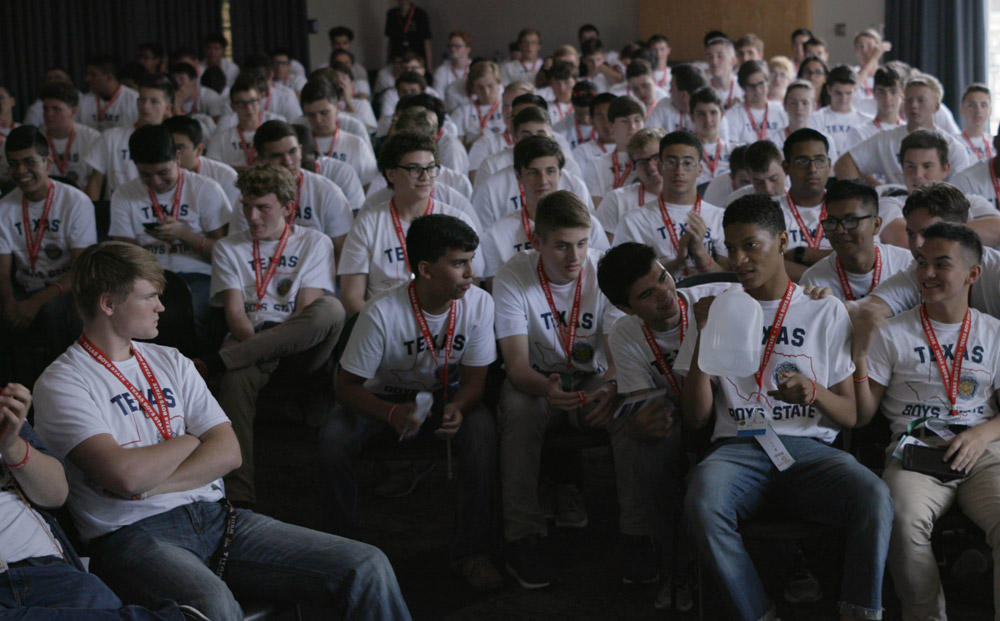Even with its outsized reputation, Amanda McBaine and Jesse Moss knew when it came to pick the right lenses to shoot “Boys State,” they needed a frame that could stretch beyond the limits of its setting of Texas.
“It was really a matter of necessity,” says Moss of filming what could’ve been a mundane political conference at the University of Texas at Austin. “When you’re dealing with drab and institutional classroom settings, you have to come up with something inventive and to make cinema, we knew we had to be intentional about it. We wanted to make that space as dynamic as we could, also to really capture what was so interesting and unique about the spaces — these boys in conversation.”
The Forty Acres have never been so alive as they are in the latest film from the duo behind “The Overnighters” and true to the University’s motto, “What Starts Here Changes the World,” McBaine and Moss have come up with a conversation starter that could pull political discourse out from its current partisan paralysis by recognizing all the factors that go into how it is shaped even at its least sophisticated level. The two were drawn to Austin after learning of a measure put forth in 2017 during a previous edition of the program that aims to build future leaders in government by offering a six-day simulation of the process of getting elected, divying a collection of high schoolers into two separate parties that create their own platforms from scratch and creating a party ticket of candidates that is voted on by week’s end. It had been a black eye to the organization, but undoubtedly an insightful window into our current climate when the boys voted to have their state succeed from the union.
That legislative motion comes up again in 2018 when McBaine and Moss’ cameras were rolling, but it is quickly shot down by René Otero, the fiery state chair of the fictitious Nationalist party who comes to find that his position of power in shaping the agenda involves tempering his own beliefs to keep some control over the group. He isn’t the only one who comes to question his idealism in “Boys State” as the filmmakers track three others who plan to make the most of their summer in Robert MacDougall, a handsome, amiable glad-hander who looks the part of a politician even if doesn’t always have a firm grasp of what’s at stake, Ben Feinstein, a savvy political mind whose instincts for campaigning secures him a place in the party when his ideas about legislation are likely too extreme to ever get him elected, and Steven Garza, who has come by his political ambitions honestly from experience and builds his constituency through powerful personal testimony.
Naturally, it is massively entertaining to watch the teenagers carry themselves like seasoned professionals, but as campaigning reaches a fever pitch in “Boys State,” you see how for as much has trickled down from those currently in power in terms of rhetoric and strategy, the opposite is true when so few of our elected representatives seem to have grown up beyond craving power and throwing around impractical notions for policy. Yet simply in showing a new generation be this engaged with the political process proves not only to be stirring drama, but galvanizing at a time when it seems like the system is overwhelmingly bigger than the people it serves and with the film arriving on Apple TV+ following rousing premieres at Sundance and True/False earlier this year, McBaine and Moss spoke about how they spent a year in the editing room to properly honor the experience they captured, covering such a chaotic event and finding hope in the most unexpected of places.
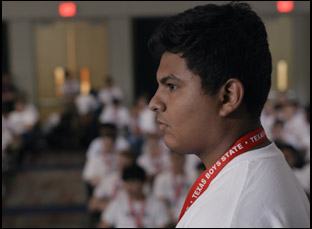
Amanda McBaine: It was totally the opposite kind of filmmaking. Usually, it’s Jesse and I and an editor. That’s how we worked on past films and we filmed them over a long period of time. This one, we had a crew of 28, four main characters and 1100 supporting characters. [laughs] And the UT campus, as you know, is quite large. We were not prepared for that. Neither of us knew how big it was and the event is spread out everywhere, so we were doing a good amount of running from one end of campus to another. We were not holding cameras, but the heroic cinematographers on the film who worked with us worked through that 103 degree heat [in the summer], so this was really a group effort more than any film we’ve never made. To amass the right people to do that with was critical and find the people we were going to follow. That was critical to our success and confidence going in because then once we got there, there was chaos. [laughs]
You’ve said there was three months of casting leading up to the event – at that time, were you discovering themes or potential storylines as you were finding the right people to follow?
Jesse Moss: It was such an important phase of this project, both for the very practical reasons of needing to identify our protagonists and ultimately antagonists. [laughs] But also figure out what kind of movie we were making and who was going to make it with us. We did have that big picture concept in our head of wanting to be in a space where people with different politics were talking to each other and understanding that through the perspectives of teenage boys. And it was interesting to ask them [questions] in casting, like when have they changed their mind? How ideologically flexible were they? Where were their politics coming from? And how did they feel about the state of political paralysis in America today? That question actually elicited the most interesting responses and really drew us to the three boys that we cast before the event started – Robert, Steven and Ben had really interesting things to say. Robert actually worked in the U.S. Senate as a page and had direct experience hearing Senators argue with different sets of facts about the same thing, so the political sophistication that came through in those conversations really emboldened us to the level of depth that we could potentially realize in this film and in their stories.
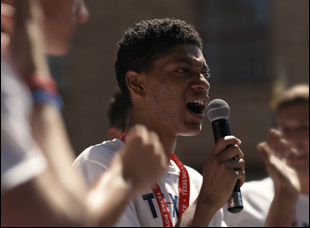
Amanda McBaine: Every time you make a movie, there’s those moments where you think, “Ih oh, there’s nothing here,” and then [others] where you feel like it’s going to be the best film that the world has ever seen. I think the truth lies somewhere in that. Neither Jesse or I had been to either Girls or Boys State ourselves when we were younger, so we didn’t know quite what to expect once the program got going and the first day was a set of Powerpoint presentations from the counselors to the kids that was very boring. It really did feel like we were in trouble, but then the counselors give the authority over to the kids and anarchy [prevailed]…
Jesse Moss: It’s like school’s out.
Amanda McBaine: It’s a good time. But the other concern for us was that two of the people we were pretty invested in, Ben and Steven, day one was really hard for both of them. We were worried that they weren’t going to go the distance even as smart and passionate and politically savvy as they were. They were just not getting traction. That really was a terrifying moment because we hadn’t met Rene yet either. But very quickly the tides changed [when] we found Rene and both Ben and Steven found their footing, so it worked out.
The interviews you do away from the event, but happen during the event become these really insightful conversations. Was it a challenge to figure out how to pull your subjects away?
Jesse Moss: That project of finding moments of sitting them down whenever we could grab them and hearing what they were thinking and going through has been, sparingly, something we’ve found very effective as a tool in storytelling. Of course, we prize the cinema verite moments, and the real project of the film was to capture this unfolding story in real time and I think we succeeded there, but there’s so much going on beneath the surface. We did build this set at UT on campus in a dorm. We took it over for the week and we just grabbed [our subjects] and they became increasingly introspective or reflective as they got more tired and the experience got more intense for them. We knew they had the capacity for self-reflection — that’s what we liked about them when we met them, and it really did bring us inside their journeys.
But I think the degree of vulnerability and transformation of really coming to know themselves that they expressed in those conversations [like] where Rene says of Ben “[He’s] a good politician, but that’s not a compliment,” it really delivered a dimension to the experience that was so valuable. In quantity, [that part of the film] was quite small relative to the mountain of verite footage, but it was extremely potent and we had to find our way through it. The edit took a year. Six days to shoot he movie, a year to cut. and even though we knew the plot, we had to find kind of the depth of the storytelling and the rhythm of it and how to use that material judiciously and effectively, so that was a lot of experimentation to figure out how to use that material.
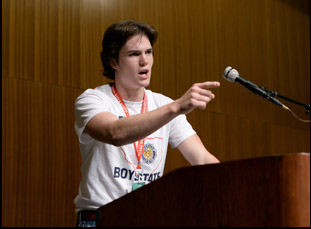
Amanda McBaine: Theme clarification happens when you’re starting to distill the 300 hours down to what that eventual one-and-a-half-hour, two hour bouillon cube is, and what’s so important in that process for us is to be accurate to our emotional journey, watching the events unfold in filming it and what we felt to be the true journeys and transformations of the four people we were following. But you have to do all of that in tandem with building the exposition of this incredibly complicated event. Government itself is a complication, plus we have four people experiencing different components of it. To Jeff’s credit, he was really spinning a lot of plates.
Jesse Moss: And we so strongly identified with Steven as the underdog politically and we identify with him personally that gave us a spine, but to deliver ourselves and the audience to a place of understanding [what he went through], I remember we shared a five-hour rough cut with our funders and we knew that we got something right when Davis Guggenheim, one of our executives leapt out of his seat and started cheering in the room [at a certain point]. It was like the energy was there, and when you make a documentary with somebody, you really forge a very intense relationship and bond. You feel their pain and share their suffering and celebrate their victories in ways that move even me, a very stoic person that tends to mediate the world through a camera, so we just wanted to bring people into and along that exhilarating ride.
Amanda McBaine: But going to theme, we went into this with a set of questions and curiosities and those are, to some degree, emotional as well. We were all struggling to figure out how the country had gotten to this place of being so divided. That was in 2017, and then we’re editing this film through 2018 and 2019 and the world is only getting more divided. So watching how hyper-polarization and divisive politics played out in this story, those scenes [in the film] became more and more stark, so during the edit, those things start to rise to the top.
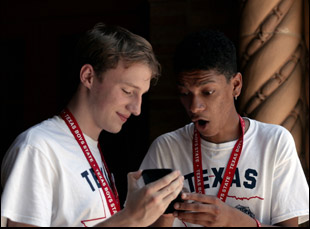
Jesse Moss: Well, we inevitably had to leave some things out. [laughs] But what drew us there to begin with was the extent to which it was mirroring, maybe in a distorted, refracted way, the national politics, so we knew that potential was there. We were really profoundly surprised on large scale and on a smaller scale with the boys themselves that the story did follow some of the contours of our conversation in ways that are extremely timely, but also timeless. The decisions that elected officials wrestle with in terms of their integrity, their willingness to bend or break their principles in order to win power, the ability of a leader to summon the better angels of an electorate, the presence of dirty tricks — internet memes, that was a language of political discourse that I wasn’t really familiar with because maybe I’m over the age of 40, and we saw it in the 2016 election for real and Russian disinformation, but that as a tool for electoral strategy was revelatory and very much of the moment. So there was both surprise and what we hoped to find in this really fascinating mirror it holds up to our democracy.
Amanda McBaine: And a reminder too that someone that’s a good leader really can summon the better half of people from both sides and I think I needed that reminder, frankly.
Jesse Moss: And that there are not good voters and bad voters. There’s voters that can be engaged through fear — we’re all capable of being fearful. Most of us also want to be hopeful and optimistic and we want to have faith in our leaders and that [they] will summon the best of us and not the worst of us, so that was the hopeful discovery. As Steven says, “You become strong by defying defeat” and it’s a reminder that it’s a struggle and it’s a long struggle too.
“Boys State” is now streaming here on Apple TV+.




